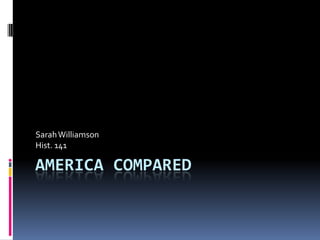
America Compared
- 1. America Compared Sarah Williamson Hist. 141
- 2. II The first theme was " Wars Against the Indians in the United States and Argentina". During the decades of the civil war, many Americans moved west of the Mississippi River to the Pacific ocean. There they established ranches, mines, farms, towns, and cities Through this westward expansion, they crossed over to the Native lands. Almost 100,000 Indians east of the Mississippi were removed westward, leaving their homelands in the eastern United States open settlement. The United States government regarded the great plains as a desert and was content at first to leave the country in the possession of the Indians. In 1492, the great plains were sparsely inhabited. In Argentina, as in the United States, a population of European descent sought to expand into a hinterland occupied by Indians. The suppression of the Indians was not only a problem in the United States. In Canada, the government moved onto Indian lands and took them over in Manitoba and Saskatchewan.
- 3. IV 1870-1920 United States was transformed from Agrarian society to urban Arrival of immigrants brought most of the population Immigration was not just to America- 5.5 million foreigners went to Argentina and 4.5 million went to Canada. Since Argentina and Canada's population was smaller, it had a greater effect on them Cause for great migration was: steamship travel, need for industrial labor force, and opening of Nationals border Most immigrants migrated in search for jobs rather than for political or religious reasons Immigrants often traveled in chains which meant they followed a relative or neighbor The immigration to the United States was different from other countries because of the volume of it, and the diversity of the sources of immigrants. It received over 3/5 of the immigrants Europe sent from the early 19th century to WWII. Not all native-born Americans liked the large immigration. In the 4 decades after 1880, the United States developed the most powerful anti-immigration movement in the New World
- 4. V The Roman splendor of Chicago's White City and the St. Louis World's Fair of 1902 advertised America's new imperia ambitions. Many Americas have assumed that there was no period of American Imperialism. Most imperialisms have been rooted in a sense of mission, and the American sense differs from that of other nations chiefly in that the United States emphasized different characteristics. Imperialism was not always in ill-repute. Imperialism was a practice; colonialism was a state of mind. Whether a powerful nation extended its control, its influence, or merely its advice over another people, those so controlled or so advised not unnaturally resented the controller. American responses to some of the assumptions of European imperialism were bound to be negative, for the United States jad grown, after all, out of a former colonial empire.
- 5. VIII The prolonged slump that descended on the American economy at the end of the 1920s was part if a worldwide crisis. In Germany, Italy, and Japan, authoritarian governments took control amid the turmoil of the Depression. A spectacular, record-breaking global boom from about 1850 to the early 1870s had been followed by the twenty-old years of economic uncertainties. The History of the world economy since the Industrial Revolution had been one of the accelerating technological progress, of continuous but uneven economic growth, and of increasing 'globalization" For farmers dependent on the market, specially the export market this meant ruin, unless they could retreat to the traditional way of the peasant; subsistence production. Brazil became a byword for the waste of capitalism and the depth of the Depression.
- 6. XI The cold war culture in early 1960’s changed after tensions due to the 1962 Cuban missile crisis. Political conformity of the McCarthy era faded out, liberal and radical groups formed and expressed their views on domestic issues. Social classes shifted and prosperity grew greatly in the 1960’s Idealism was a driving force behind the two major political movements: the civil rights movement and the women’s rights crusades for equal rights Both movements were based on years of discrimination and protest.
- 7. X Instead of peace, the end of World War 2 brought a different kind of war, one that erupted into military conflict only sporadically bit loomed over the earth's people for merely 50 yrs, threatening their very survival. The Cold War was a presumably mortal antagonism, arising in the wake of the Second World War, between two rigidly hostile blocs, one led by the Soviet Union, the other by the United States. The Russians were determined to protect their frontiers, and especially their border to the west, crossed so often and so bloodily in the dark course of their history. The western frontiers lacked natural means of defense. The United States was rejected the idea of stabilizing the world by division into spheres of influence and insisted on an East European strategy.